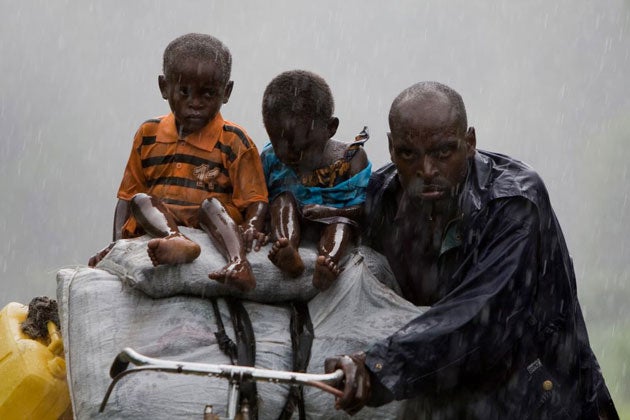UN convoy brings aid amid fears for Congo refugees

Your support helps us to tell the story
From reproductive rights to climate change to Big Tech, The Independent is on the ground when the story is developing. Whether it's investigating the financials of Elon Musk's pro-Trump PAC or producing our latest documentary, 'The A Word', which shines a light on the American women fighting for reproductive rights, we know how important it is to parse out the facts from the messaging.
At such a critical moment in US history, we need reporters on the ground. Your donation allows us to keep sending journalists to speak to both sides of the story.
The Independent is trusted by Americans across the entire political spectrum. And unlike many other quality news outlets, we choose not to lock Americans out of our reporting and analysis with paywalls. We believe quality journalism should be available to everyone, paid for by those who can afford it.
Your support makes all the difference.A United Nations aid convoy was due to reach the worst-affected area north of the threatened city of Goma this morning after Congolese rebels agreed to let in humanitarian workers.
There is a desperate push to reach an estimated quarter of a million people who have been affected by the fighting while the fragile ceasefire holds between Congolese government forces and the rebel army controlled by renegade general Laurent Nkunda.
The convoy, to be accompanied by 500 UN troops, will set out from Goma after the British and French foreign ministers, David Miliband and Bernard Kouchner, visited the stricken region together and declared that establishing a humanitarian corridor was a priority for urgent aid to reach those displaced by the sudden escalation of the conflict.
"The crisis in eastern Democratic Republic of Congo commands our attention because of the history of the region, the scale of the human suffering," the two said in a joint statement. "There is no excuse for turning away."
But their statement, issued after talks with the Congolese President, Joseph Kabila, in Kinshasa and the Rwandan President, Paul Kagame, in Kigali failed to commit their countries or the European Union to sending extra troops to bolster the UN force. They called for the force of 17,000 troops – the largest UN peacekeeping mission in the world – to be strengthened.
The ministers travelled to Congo in hope of securing a longer-term political solution. They are now pinning their hopes on a summit between the Congolese and Rwandan leaders that could be held in Nairobi next week as part of regional efforts to ensure that existing peace accords are implemented.
But security sources in Goma believe fighting could resume tomorrow, with many predicting that General Nkunda's rebels will storm the city while the rest of the world is watching the US election. Goma is the largest city in Eastern Congo and centre of operations for the UN and aid organisations, its fall could trigger a mass exodus and bring the region to the brink of a much larger war.
The situation in Goma remains extremely tense despite the ceasefire holding for a third day, and many people are terrified that the city could suffer the same fate as Bukavu, where there was widespread killing, raping and looting in 2004 when the city fell to General Nkunda's fighters.
The civilian population in the east of the vast country was already living in terrible conditions with thousands dying every month from disease and starvation while rebel groups and the country's notoriously brutal and chaotic armyv ie for control of the region's rich natural resources.
The war-torn town of Rutshuru, 55 miles north of Goma and now under the control of General Nkunda's National Congress for the Defence of the People, is where the need is most urgent. There is a chronic lack of clean drinking water, according to aid groups, and a desperate shortage of doctors and nurses. The UN convoy will be trucking in water, medicine and health workers.
The town has been in chaos since 30,000 people were forced out of a refugee camp by the NCDP rebels.
General Nkunda's forces have been able to advance almost unhindered in recent weeks despite the presence of the UN's largest peacekeeping force, Monuc, and the Congolese army, which has been routed. Thousands have fled into the surrounding jungle to escape the fighting, with both sides routinely killing, raping and looting.
Aid groups, including the UK charity Oxfam, have called for a European force to step in before a humanitarian disaster explodes. "Monuc clearly can't cope and a European force has worked in the past," said Juliette Prodhan, Oxfam's director in Congo.
In Kibati, several miles north of Goma, desperate refugees would welcome European forces as UN peacekeepers are widely disliked and seen as ineffective. The camp at Kibati has witnessed what could happen on a much larger scale if the crisis deepens, as it swelled from 15,000 to 50,000 people in a single day.
"We want to return to our village, but only if there is security. I have not eaten for six days," one elderly woman, Rgwasa Nyakaruhije, told Reuters. "We would be very happy if they sent in a European Union force."
Join our commenting forum
Join thought-provoking conversations, follow other Independent readers and see their replies
Comments